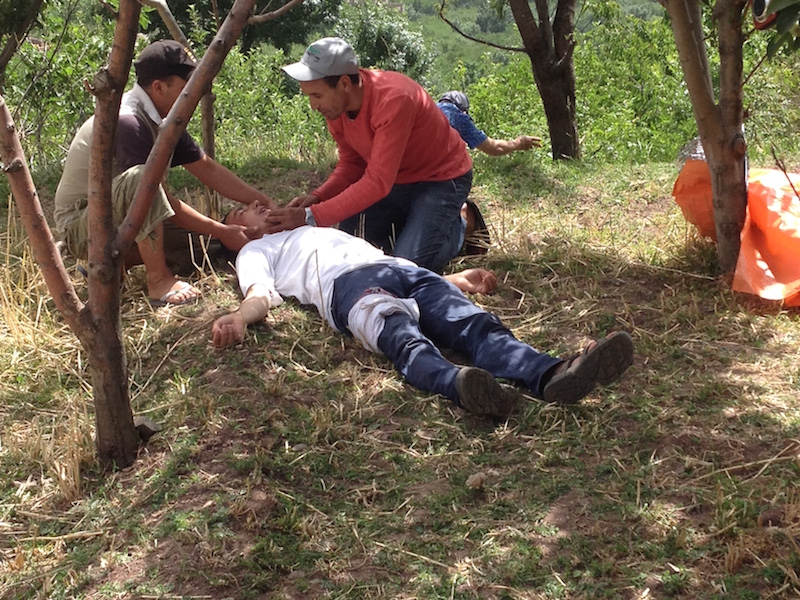Outdoor First Aid Training for Mountain Guides on Mount Toubkal
Mount Toubkal, the highest peak in North Africa, offers stunning views and a challenging climb that attracts adventurers from around the globe. Based in Imlil, Morocco, mountain guides play a crucial role in ensuring the safety and success of those aiming to summit this iconic peak. However, the rugged terrain, high-altitude conditions, and unpredictable weather demand more than just expert navigation skills. Comprehensive first aid training tailored to the specific challenges of Mount Toubkal equips guides with the ability to manage emergencies and protect their clients in this demanding environment.
Our outdoor first aid course for Toubkal mountain guides focuses on the unique risks associated with high-altitude trekking and remote mountain environments. One of the key aspects of the training is recognising and managing altitude sickness, a common issue for those ascending to the summit. Guides learn to identify the symptoms of Acute Mountain Sickness (AMS), such as headaches, nausea, and dizziness, as well as more severe conditions like High-Altitude Pulmonary Oedema (HAPE) and High-Altitude Cerebral Oedema (HACE). Practical sessions cover how to use tools like pulse oximeters, administer oxygen if available, and, most importantly, when to initiate a descent to save a life.
The rocky and uneven terrain of Mount Toubkal increases the risk of injuries such as sprains, fractures, and head trauma from falls. Our training includes stabilising fractures, splinting broken limbs, and immobilising suspected spinal injuries. Guides also practice improvising stretchers for evacuations in areas where professional medical help may be hours away. These hands-on scenarios mimic the conditions found on the mountain, ensuring guides are prepared for real-world emergencies.
Cold temperatures near the summit and the risk of sudden weather changes can expose climbers to hypothermia. Guides learn to spot the signs of cold exposure, including confusion and fatigue, and practice techniques for rewarming casualties. In addition, we cover wound care for cuts and abrasions, which are common on rocky ascents, emphasising infection prevention in remote settings.
Another key focus is CPR training, specifically for remote environments. Guides practice delivering chest compressions and using AEDs (automated external defibrillators) when available, as well as adapting resuscitation techniques for hypothermic casualties. The ability to perform high-quality CPR can be a life-saving skill when professional medical care is not immediately accessible.
Working out of Imlil, mountain guides often encounter clients with pre-existing medical conditions such as asthma, heart issues, or diabetes. Our course equips guides to manage these conditions during the trek, recognising warning signs of complications and providing appropriate care to prevent emergencies. Communication is also a critical component, with guides learning how to relay essential information to rescue teams or medical professionals in a timely and effective manner.
The training is built around realistic, scenario-based exercises that reflect the challenges of guiding on Mount Toubkal. Guides practice responding to emergencies on steep, rocky trails, managing casualties in cold and windy conditions, and coordinating evacuations when access to the mountain is limited. This practical approach ensures that the skills learned are directly applicable to their daily work.
Guiding on Mount Toubkal is both a privilege and a responsibility. By investing in outdoor first aid training, guides not only enhance their professional expertise but also build the trust and confidence of their clients. Being prepared for emergencies ensures a safer and more enjoyable experience for everyone involved, whether tackling the rocky ascent or celebrating the summit’s panoramic views.

For guides based in Imlil, this course provides the essential tools to respond to the unique hazards of Mount Toubkal. It’s not just about meeting industry standards—it’s about being ready to act when it matters most, ensuring every trek is both a challenge and a triumph.
To book a course contact us via email in the first instance. Cory Jones our Director is lead trainer for a range of organisations including First Aid Training Co-operative, Kingfisher Journeys and Adventure First Aid in Kenya.










